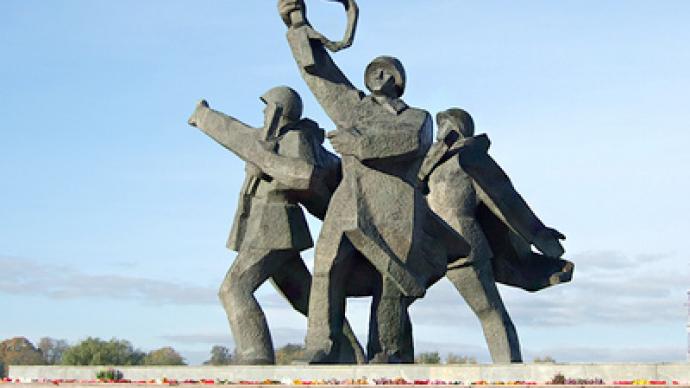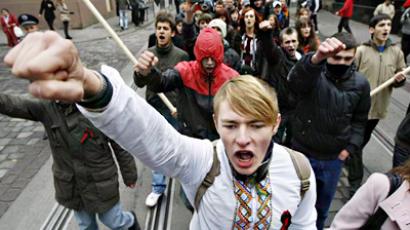Ghosts of WWII haunt Russia-Latvia relations

In the latest diplomatic eruption between Moscow and Riga, the Russian Foreign Ministry rejected reproaches by the Latvian foreign minister over the Russian ambassador to Latvia’s refusal to attend events held in Riga's Brothers' Cemetery on May 8.
"We find the accusations made by the Latvian minister against the Russian diplomatic mission to be irresponsible and extremely inappropriate," Russian Foreign Ministry official Alexei Sazonov told a press conference in Moscow on Friday.Sazonov said that the decision not to attend the event was not made out of disrespect to Latvian and European traditions, but rather due to the fact that officials who showed allegiance to Nazi Germany are buried at the cemetery."In this particular case, we are not talking about any personal sympathies of the Russian ambassador (Alexander Veshnyakov), let alone disrespect of the state symbols of Latvia or the celebration of Europe Day," Sazonov stressed. "The thing is that it is unacceptable for us to participate in protocol events conducted by Latvian authorities in the Brothers' Cemetery because top Waffen SS officials Bangerskis and Veiss, who are to blame for grave war crimes and punitive operations against guerillas and the civilian population in World War II, are buried there.”(Sazonov is referring to Rudolfs Bangerskis, (1878-1958) who was appointed Inspector-General of the Latvian Volunteer SS Legion by the Germans in April 1943, and Voldemars Veiss, (1899-1944), a Lieutenant Colonel in the Latvian Army and a Colonel in the German Waffen-SS).Brothers’ Cemetery, located in the Latvian capital of Riga, is a military cemetery and national monument.A “depressing” venue from Russia’s perspectiveMeanwhile, Konstantin Dolgov, the Russian Foreign Ministry's special representative on human rights called it “depressing” that Riga would choose to mark May 8 ceremonies at Brothers’ Cemetery considering that many countries would mark Victory Day against the forces of fascism one day later on May 9.The organization of official events in Riga’s Brothers' Cemetery on May 8 "is especially depressing against the backdrop of the celebrations of the 66th anniversary of the Victory in the Great Patriotic War held in many countries, including Latvia, on May 9," Dolgov told Interfax on Friday.The Foreign Ministry official then reminded the conference that “the celebration of the anniversary of the Victory in Latvia has been smeared several times by nationalist elements' attacks.”"This once again confirms that the Latvian authorities should focus on improving the bad situation with human rights in the country and fulfilling the appropriate recommendations of the UN Human Rights Council," Dolgov said.The UN Human Rights Council adopted on May 9 a series of 122 recommendations to Latvia under the Universal Periodic Review (UPR), requesting it to initiate reforms in such areas as human rights, citizenship, treatment of ethnic minorities, human trafficking, gender inequality and prison conditions, according to the Latvian news agency.Latvia agreed with 71 of the recommendations, but rejected seven outright, including Russia's proposal to abolish the status of "non-citizen"."It is regretful that the recommendation to abolish non-citizenship was rejected by Riga without any explanation," Dolgov said.The Russian diplomat also expressed hope that the Latvian authorities would study the recommendations closely and "act upon them in an appropriate manner."The Latvian parliament in 1991 created the category of "non-citizen," which largely applies to Russians who moved to Latvia during the Soviet period. Latvia currently has around 350,000 predominantly Russian people without formal citizenship. Under Latvian law, “non-citizens” are not considered stateless persons, but lack full rights, including the right to vote.Latvia is a Baltic nation of 2.3 million people with an ethnic composition that is 59.4 per cent Latvian, 27.6 per cent Russian and 13 per cent other.Meanwhile, it was reported that some 200,000 people took part in festivities near the monument to Soviet soldiers in central Riga on the occasion of Victory Day on May 8 and 9, sources in the press service of "9may.lv" public organization told Itar-Tass on Tuesday.Flowers and wreaths were laid at the monument to Soviet soldiers by Russia's ambassador to Latvia, deputies of the Latvian Saeima (parliament) from the opposition Centre of Accord party and representatives of the Riga Duma led by Riga Mayor Nil Ushakov, as well as diplomats and representatives of the embassies of Belarus, Uzbekistan and Kazakhstan.Riga Mayor Nil Ushakov had warm words for the World War II veterans."I wish to express gratitude to veterans for the fact that we live today. We are proud of our veterans and we remember their exploit. We are grateful to them for our well-being and a happy life. Their children, grandchildren and great grandchildren gathered here today. We are responsible for preserving this world safe and happy so that there should be no corruption and venality in our country and no split according to nationality," Ushakov said.May 9 is not an official holiday in Latvia, but many people, mostly ethnic Russians, celebrate Victory Day.Tens of thousands of people gather every year at the monument to pay respect to the Soviet liberator-soldiers, lay flowers at the monument and congratulate veterans.













